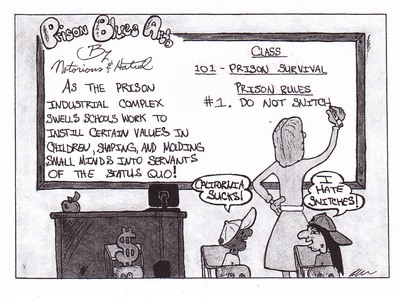Revolutionary greetings to all who stand in opposition to the oppression
being inflicted upon the people! I’m writing to you from within the
depths of the Utah state prison where it’s business as usual for these
oppressive devils. Here in the housing unit known as Uinta One, the
vents are pumping out cold air and there’s nothing much that can be
done, because if we go off and buck on the cops we will only gain a 48
hour strip cell. The situation is sickening, but only one of many!
I was placed in Uinta One at the beginning of December with no
explanation other than that I was “under investigation.” I was already
housed in maximum security gang housing under “Severe Threat Group”
(STG) classification. I’ve been put under numerous investigations before
this one and it usually involves my cell being tossed and all property
being searched or seized, along with mail and phone calls being
monitored. But now they choose to start the investigation by taking all
my stuff and shipping me to the hole where it took over 35 days before I
could even order a bar of soap or deodorant from commissary.
This has been done to many other prisoners who are housed in the
so-called STG program. Most of the prisoners whose scheduled release
from STG maximum security is close, or past due, do not get moved to
less restrictive housing, and the ones who are at the forefront of
fighting this injustice are often subject to more harassment, or in
certain cases moved to “deeper” parts of the hole, aka Uinta One.
Most recently the prisoners of Uinta Two, both STG and non-STG, have
been petitioning to change the privilege level system to one that treats
all maximum security prisoners equally. They are demanding that we all
be allowed to get 3 visits a month, unlimited phone calls while on
recreation (out of cell time, which is one hour and 15 minutes every
other day) and to be allowed the same spending limit on commissary.
These privileges are provided to prisoners who are in maximum security
but not classified as STG. What is the difference between a maximum
security prisoner who is STG and one who’s not? Nothing other than how
the oppressors have decided to classify us. Some members of LOs are
considered STG and others are not, yet we live together in the STG unit
regardless of a prisoner’s STG status, as long as our LOs are believed
to get along with each other.
Prisoners’ first amendment rights are clearly violated by the STG policy
and program here. They punish us by locking us in maximum security where
we only recreate one cell at a time for an hour and 15 minutes every
other day. We are given STG classification for tattoos or suspected gang
affiliation without ever even having any write ups (disciplinary
convictions) in this prison.
The oppression is real and thick here at the Utah State Prison, but we
are fighting back.
I hope that all of the prisoners who are showing unity can continue to
enlighten each other and others to the need for a united struggle! I
know we have our differences, but we all are similarly oppressed. Stand
tall, stand strong.
MIM(Prisons) adds: “Threat Group” classification is used by
prisons across the country to target oppressed nation prisoners,
specifically those who are politically active and organizing others to
stand up for their rights. The classification system is arbitrary and
allows use of things like holiday cards, or legal help, as evidence of
association. Further, in many states the evidence is kept secret so
prisoners can’t fight false classification. This status often gets
prisoners locked in isolation units, where conditions like those
described above eat away at physical and mental health. This is part of
the systematic oppression of the criminal injustice system, serving
imperialism by keeping the lumpen in check. As this prisoner wrote,
unity is key to our fight against this system.









